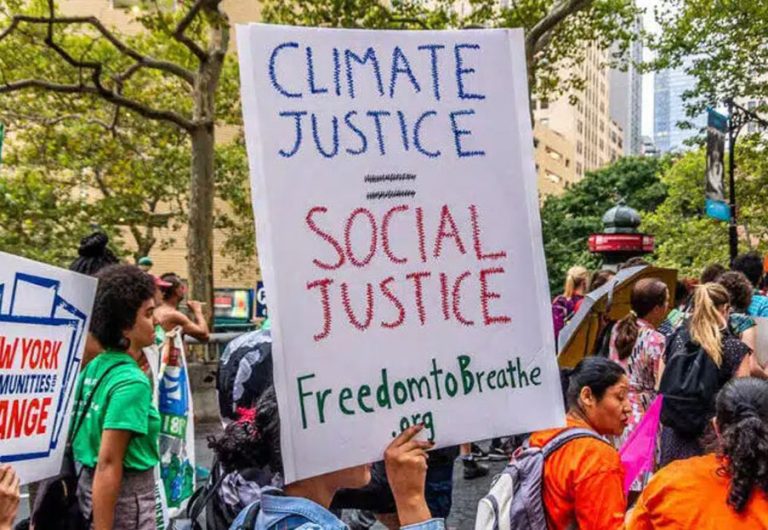Integral Ecology – A Concept of Pope Francis

July 24, 2024
By Paolo Conversi | Coordinator of the Laudato si’ Observatory, Pontifical Gregorian University
[From “Jesuits 2024 – The Society of Jesus in the world”]
A change of perspective that leads to the need for a new economic, environmental and social paradigm.
The concept of integral ecology is an insight from the 2015 Encyclical Laudato si’ (LS), which Pope Francis dedicates to the care of our common home.
Associating integral ecology with care for our common home brings us back to the etymological meaning of the noun “ecology.” It is derived from the Greek words “oikos”: “house,” and “logos”: “study, reflection.” From this perspective, ecology should be understood not so much as a discipline that lies within the realm of the natural sciences, as we usually understand it by referring, for example, to the study of ecosystems, but as something broader that also calls into question the various relationships within our common home.
These relationships start from the assumption that “everything is interconnected” and must be implemented with responsibility, especially by those who can exercise this responsibility: us human beings. Being part of one interdependent human family, the decisions and behaviours of one of its members have profound consequences on its other members, especially the most vulnerable.
With the concept of “integral ecology,” Pope Francis intends to propose a new vision and approach based on a change of perspective that:
1) highlights the inseparability of “concern for nature, justice to the poor, commitment to society and inner peace” (LS, 10);
2) can “recover the different levels of ecological balance: the inner one with oneself, the solidary one with others, the natural one with all living things, the spiritual one with God” (LS, 210);
3) becomes aware of the responsibility of the human being, of each of us, toward self, toward our neighbour, toward society, toward creation and toward the Creator.
This change of perspective, the result of a gradual rise in consciousness, points to the need for a new economic, environmental and social paradigm that is more resilient and inclusive: this is the big wager that is actually a cultural revolution that will bring with it the change of lifelong habits first and foremost on the individual level. This “reorientation” must hinge on three “beacons of consciousness,” of which there is a shortage: the consciousness of a common origin, mutual belonging, and a future shared by all. Illuminated by these beacons, it is possible to promote new attitudes and lifestyles.

The perspective to be adopted is necessarily global but must be implemented from the local dimension: it is necessary to start from the small, from everyday habits, from small gestures of daily life. The global and local implementation of a correct integral ecology is essential to effectively address the causes of the current ethical-socio-environmental crisis: we are faced with a cultural, spiritual and educational challenge that highlights the need for a “change of course”: to move from a culture of waste, in which our society is enmeshed, to a culture of care: care for oneself, for others (near or far in space and time), and for the environment.
The ethical-socio-environmental crisis thus represents not only a serious concern, but also an opportunity, a privileged moment of stimulus to more authentic living and to an individual and communal “ecological conversion” (LS, 231) … in action.
For integral ecology to truly represent a driver of innovative and sustainable development, it is necessary to leverage the biblical mandate to “cultivate and care for” our common home (cf. Gen. 2:15). These are two intimately related actions that affect not only our natural environment but also all those who inhabit it and share it with us, now and in the future. “This implies a relationship of responsible reciprocity between human beings and nature” (LS, 67), which cannot but reverberate in greater attention and sensitivity to “people” who live in areas most affected by social and environmental change. For too long this sense of “responsibility” has been lacking in our societies and culture. Growing in awareness of this responsibility is the best way to address today’s sustainability crisis.
The coming revolution in integral ecology will have no less planetary consequences than those caused in the last two centuries by the industrial revolutions that have followed one another since the mid-18th century.
Francis states that “humanity still has the capacity to work together to build our common home” (LS, 13). All of this leads us to “recognize the greatness, urgency and beauty of the challenge before us” (LS 15): “while the humanity of the post-industrial period will perhaps be remembered as one of the most irresponsible in history, it is to be hoped that humanity at the dawn of the 21st century may be remembered for having generously shouldered their own grave responsibility” (LS, 165).
In 2018 at Rome’s Pontifical Gregorian University, an initiative was born called “Laudato si’ Observatory”. Its purpose is to follow up on Pope Francis’ call to respond to the current ethical-socio-ecological crisis through a “change of course” founded on the promotion of integral ecology … well aware that this represents a great cultural, spiritual and educational challenge that will involve a long journey of renewal. The Observatory aims to develop continuous in-depth work on the promotion and implementation of Laudato si’ from educational, operational and pastoral perspectives at local and global levels.

